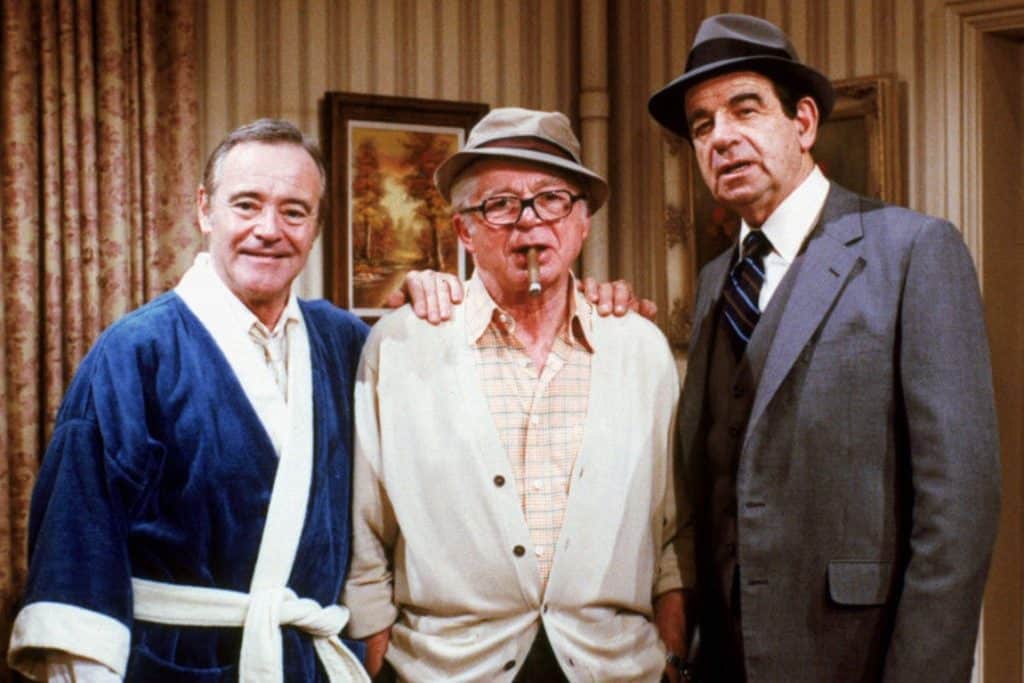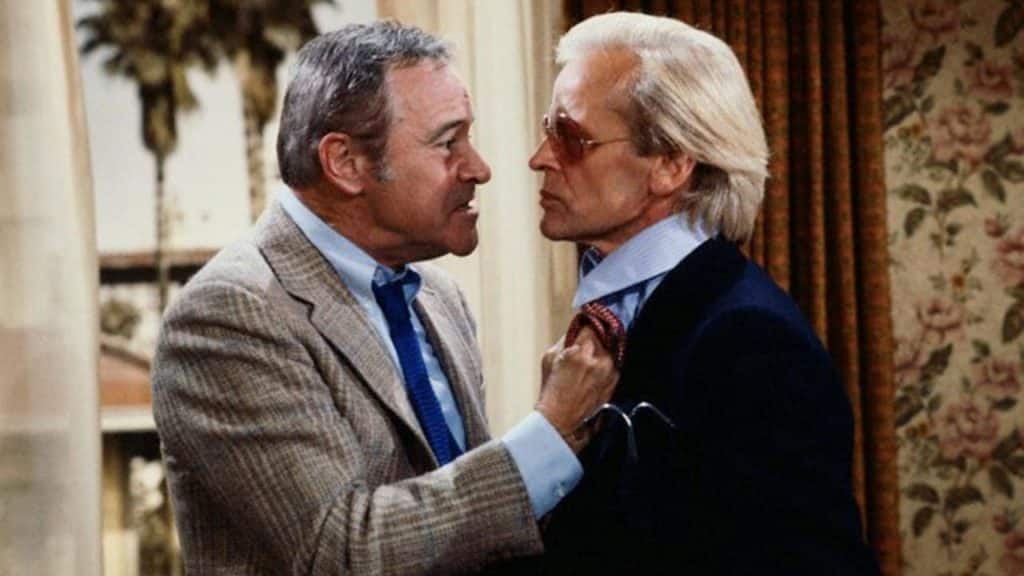There are some movies that receive critical scorn and commercial indifference upon the time of their initial release, only to find their reputations rehabilitated with the passing of time and reevaluation. That hasn’t been the case with Billy Wilder’s 1981 dark comedy Buddy Buddy; if anything, its reputation has actually gotten worse over the years — and it wasn’t exactly starting off from a high point.
When it was released as part of the crowded 1981 holiday season, it was slaughtered by critics as a vulgar and cheap-looking exercise in tedium from a legendary filmmaker who seemed profoundly out of touch with contemporary cinema. Audiences pretty much completely ignored it. To make things worse, the film proved to be the finale of Wilder’s long and celebrated career (though he would at one point make an attempt to adapt Schindler’s List before Steven Spielberg made it). On the rare reappraisal of Buddy Buddy —mostly in biographies and retrospective articles on Wilder—it’s generally decried as a sad ending to a brilliant career, a prime example of the perils of working long past your prime.
Even if someone were foolhardy enough to reevaluate it, the fates and rights holders have made that all but impossible. To my knowledge, it has never been domestically released on DVD or Blu-Ray, isn’t legally streaming anywhere and, with the possible exception of a rare TCM airing, hardly ever turns up on television. It pops up from time to time in a quasi-legal manner on YouTube—occasionally dubbed into another language—but other than that, it’s almost as if the thing never existed, which is how most people would seem to prefer it.

In doing these anniversary pieces, I’ve tried on occasion to take a film that has generally been ignored or reviled and make a case for their great qualities. That’s not entirely the case here; even if there was an easier way to actually see Buddy Buddy these days, even the kindest reappraisal would have to admit it’s nowhere near the level of Wilder’s unquestionable triumphs. Despite that, I do have sort of a soft spot for it—as I tend to do for the most maligned efforts by major filmmakers. I believe it really is worthy of another look, even if it’s unlikely to change minds.
Buddy Buddy is based on L’emmerdeur, a play by Francis Veber that would be transformed into a 1973 film of the same name with Jacques Brel and Lino Ventura, a smash hit overseas and a moderate success on the American arthouse circuit. The idea of doing a remake was pitched to Wilder as a prospective vehicle to reunite him with Jack Lemmon and Walter Matthau, with whom he had collaborated successfully on The Fortune Cookie (1966) and less so on The Front Page (1974). Still reeling from the poor reception of his previous film, the strange Sunset Boulevard remix Fedora (1979), Wilder signed on and he and longtime collaborator I.A.L. Diamond set to work on an adaptation.
As the film opens, we see a hitman named Trabucco (Matthau) employing various disguises to bump off two key witnesses before they can testify in an upcoming mob trial. When the final witness is put into heavy protective custody, Trabucco elects to take a room in the hotel across the street so he can shoot his target from there as he is being led into the courtroom. Unfortunately for him, the room next door is taken by Victor Clooney (Lemmon), a CBS censor who has plunged into despair ever since his wife (Paula Prentiss), a 60 Minutes researcher, went off to gather information on a weirdo sex clinic and decided to leave her husband and take up with the clinic’s founder, the decidedly strange Dr. Hugo Zuckerbrot (Klaus Kinski… yes, that Klaus Kinski).
Even a substandard Billy Wilder effort is more interesting than the best work of many other filmmakers.
Unable to convince his wife to come back, Victor has decided to commit suicide but his feeble attempts—trying to hang himself from the water pipe in his bathroom or jumping off the ledge of the building—not only fail but call too much attention to that part of the hotel just as Trabucco is preparing for the hit. With the hour for the kill rapidly approaching, Trabucco is forced to befriend Victor and even agrees to take him out to the clinic to try to win back his wife. When that fails, they return to the hotel and further complications set in, such as an incorrectly injected sedative that leaves Trabucco incapacitated and Victor trying to do his new best friend a favor by taking the shot himself.
In many ways, watching Buddy Buddy is an alienating experience. It’s a farce, but one played at a sluggish pace that leaves viewers with plenty of time to contemplate the various lapses in logic. (Why doesn’t Trabucco simply kill his troublesome neighbor and be done with it?) it’s also one that, as everyone seemed to realize once it was completed, was also undone by the faulty casting of Matthau as the hitman. Casting a comic actor instead of someone more convincing as a tough guy, there’s a notable lack of tension that tends to undercut the proceedings.
For fans of Wilder (who cleverly outsmarted the censors throughout his career), to see him working with no such restrictions—dropping f-bombs and jokes about sex and pot—must have been disconcerting. The style is also kind of strange. Although it was made and is ostensibly set in 1981, the mise-en-scene—the flat lighting, the obvious use of rear projection in a few driving scenes, and anachronistic touches like Trabucco posing as a milkman to reach a target—suggest a film from a different era.

Despite all of that, Buddy Buddy is a fascinating film to watch, and certainly funnier than its reputation might suggest. As some have observed, it would serve as an unconscious blueprint for any number of funny-hitmen films that would arrive in the following years. Although miscast, Matthau pretty much scores throughout as Trabucco, and when he finally tells Lemmon’s increasingly needy and whiny character to fuck off at one point, it comes as a jolt. He and Lemmon play nicely off of one another, and the sight of them acting opposite the likes of Klaus Kinski is certainly a sight.
Speaking of Kinski (who evidently hated the experience of working with Wilder), he gets to deliver the film’s funniest line—“Premature ejaculation means always having to say you’re sorry”. There are a number of other inspired bits of dialogue that show that Wilder and Diamond hadn’t lost all of their comedic instincts. (“Have you ever been married, Mr. Trabucco?” “Once, but I got rid of her. Now I just lease.”)
Thanks to its poor reputation and general unavailability, Buddy Buddy is generally thought of today (if at all) as a misfired curiosity at best and a full-on career-killing disaster at worst. I cannot claim it as some unsung masterpiece because it isn’t, but it’s more than just a black mark on Wilder’s career. While no one will ever mistake it for a classic, it does generate a certain morbid charm. If nothing else, it proves that even a substandard Billy Wilder effort is more interesting than the best work of many other filmmakers.